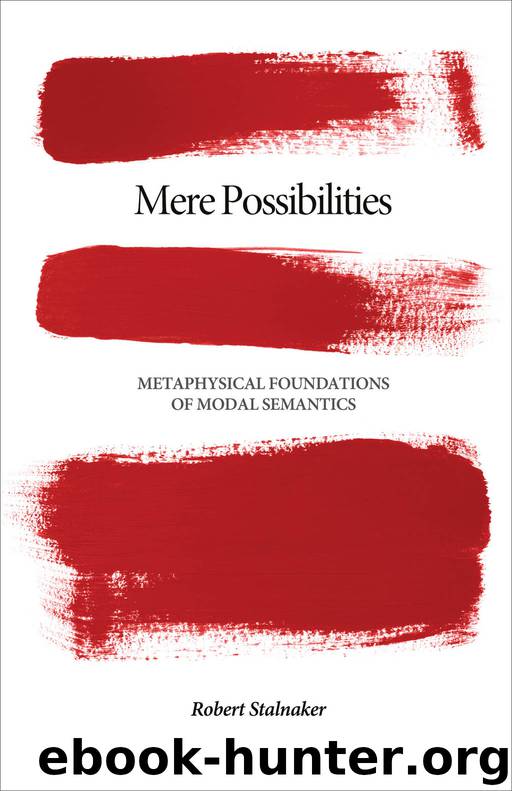Mere Possibilities by Stalnaker Robert

Author:Stalnaker, Robert.
Language: eng
Format: epub
Publisher: Princeton University Press
Published: 2012-03-21T16:00:00+00:00
9. Conclusion
In the end, I can offer no decisive resolution of the metaphysical issues about haecceitism. Both sides can give a formally coherent theory, and both can go some way toward accommodating the phenomena that all agree must be accommodated. What the dialectic of metaphysical argument does accomplish is, first, to connect different issues—to articulate more comprehensive contrasting pictures. The issue about haecceitism focuses on different views of the nature of qualitative properties and relations—of suchness, as contrasted with thisness. I emphasized the diversity of qualitative properties and relations, where we mean to include all properties and relations that contrast with those that depend on particular individuals, and I tried to bring out some ways that issues about haecceitism interact with questions about the nature of space and time, and about the reducibility of dispositions, counterfactuals, and causal and explanatory properties. More specifically, I argued that Lewis’s thesis of Humean suervenience, his thesis of anti-haecceitism, and his modal realism are all motivated by a unified metaphysical picture that requires a sharp (and in my view problematic) distinction between the intrinsic and the relational properties of possible worlds. For the actualist, the distinctions there are to be drawn between the possible states of the world are inevitably grounded in facts about the actual world, including facts about particular individuals and about the dispositions and potentialities of things. On this picture, one can understand what a possible world would be like only by its relation to our world and to the other possible ways that a world might be.
A second thing that the dialectic of metaphysical argument might accomplish is to help disentangle semantic from substantive questions. We aim to find a more or less neutral framework in which the alternative metaphysical pictures can be sharpened and compared. There is no absolute neutrality: the aim is to find a framework that is neutral with respect to specific controversies. The general theory of propositions I have been using is certainly not free of controversial commitments, but it aims to provide a framework that can accommodate haecceitism and its contrast, each in various forms. Some of the differences between the contrasting metaphysical accounts may in the end turn out to be notational or purely semantic, but that is a question that cannot be settled in advance. The next chapter will focus specifically on the interaction of questions about semantics and intentionality with questions of metaphysics.
Download
This site does not store any files on its server. We only index and link to content provided by other sites. Please contact the content providers to delete copyright contents if any and email us, we'll remove relevant links or contents immediately.
| Anthropology | Archaeology |
| Philosophy | Politics & Government |
| Social Sciences | Sociology |
| Women's Studies |
Lateral Thinking by Edward de Bono(987)
The Little Blue Reasoning Book: 50 Powerful Principles for Clear and Effective Thinking by Brandon Royal(809)
A Primer on Legal Reasoning by Michael Evan Gold(768)
A Rulebook for Arguments by Weston Anthony;(712)
Dictionary of Untranslatables: A Philosophical Lexicon (Translation/Transnation)(588)
Every Word Is a Bird We Teach to Sing by Daniel Tammet(548)
Poor Richard's Almanack by Benjamin Franklin(536)
Logics and Falsifications by Andreas Kapsner(536)
From Poverty to Power by James Allen(526)
The Art of Logical Thinking by William Atkinson(517)
So You Think You Can Think by Christopher W. DiCarlo(513)
The Art Of Thinking In Systems: Improve Your Logic, Think More Critically, And Use Proven Systems To Solve Your Problems - Strategic Planning For Everyday Life by Steven Schuster(507)
Game of Logic by Lewis Carroll(493)
Irony and Sarcasm by Roger Kreuz;(487)
The Practice of Argumentation (Critical Reasoning and Argumentation) by David Zarefsky(480)
Logic Made Easy by Deborah J. Bennett(468)
The Ingenious Language by Andrea Marcolongo(458)
How to Win Every Argument: The Use and Abuse of Logic (2006) by Madsen Pirie(456)
The Moscow Puzzles: 359 Mathematical Recreations by Boris A. Kordemsky(444)
